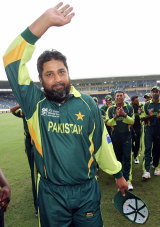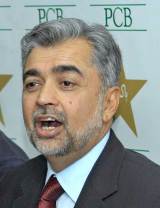
|

Inzamam-ul-Haq's run in the Pakistan ODI side came to an abrupt and traumatic conclusion
© Getty Images
|
|
It's a new dawn,
it's a new day,
it's a new life
For me
and I'm feeling good
'Feeling Good' - Eunice Waymon aka Nina Simone, 1965
A brief dawn in Lahore gave way to the rising of the sun at 5.53am PST today. Six hours and seven minutes later, at Gaddafi Stadium, one day ended in Pakistan cricket with Inzamam-ul-Haq's heated press conference. An hour after that, a new day began with the chairman's press conference.
Four years ago, another new dawn greeted Pakistan's cricket and yet it appears in no better shape today than when Waqar Younis's dysfunctional rabble was dumped out of South Africa. Possibly worse, some contend. Cynicism in these times comes cheap and easy. There is no captain, no coach, no selectors and a chairman who was waiting to resign but now hasn't. Yet hope must be found somewhere.
Well, unlike 2003 axing over half the squad is unlikely and on balance, unnecessary. A changing of the guard felt natural then, in a team still carrying Wasim Akram, Waqar Younis and Saeed Anwar, all of whom had seen better decades.
This Pakistan side, in contrast, is still young; officially (birth records being the imposters that they are here) only three of Pakistan's 15 in the Caribbean are over 30. Outside, Mohammad Asif and Abdul Razzaq also remain twenty-somethings.
The captaincy need not be such a thorny decision either. As leader, the succession plan points to Younis Khan to assume a position he, and everyone else, has been expecting for some time. That is something not oft-said in Pakistan.
Yet, there exists hesitancy within the PCB, also evidenced by the chairman's willingness to defer an appointment for at least a month (though he remains, personally, in favour). Younis appears a widely-backed choice and the logical one too, his Champions Trophy tantrum notwithstanding. Given how rare consensus is locally, should it not be seized upon immediately?
 As leader, the succession plan points to Younis Khan to assume a position he, and everyone else, has been expecting for some time
As leader, the succession plan points to Younis Khan to assume a position he, and everyone else, has been expecting for some time
 |
Replacing Inzamam's middle-order presence will take some doing. Pakistan dithered between grooming a middle-order bat and playing an allrounder in recent times. The uncertainty was without beneficiaries; Asim Kamal was lost, Faisal Iqbal persevered with without feeling, Yasir Hameed sidelined and neither Shahid Afridi nor Razzaq provided any lasting security. Who is to come through? No obvious batting prodigy lies undiscovered.
Domestic cricket is not shielding any exceptional openers either, though if the new selection committee perseveres with one pair for longer than the last one did with any, they might reap some reward. The bowling, when healthy, is in ruder health but there should be concern at the National Cricket Academy that only one player from two successive U-19 World Cup winning sides has managed to play for Pakistan. And Riaz Afridi only played one Test over two years ago.
Within the grand red bricks and plush offices of Gaddafi Stadium, more needs doing. Nasim Ashraf stays on, to the chagrin of many, but also with the defense plea that he had been handed charge of a sinking ship only six months before the World Cup; he maintained throughout that his work was to begin after and now is his chance. People can shout till they're blue that he shouldn't be there at all, but he is now and that can only be changed by the President. With him comes a new management team altogether.
It is unlikely to be so, but the first task should be to find and implement the constitution. It is now, apparently, in "legal vetting" with the Attorney General but whatever the phrase, there is little question that it is something that has been deliberately and persistently sidelined administration after administration. No more. Pakistan has been ad-hoc from 1999, since when un-coincidentally, cricket has been at its maddest.

|

Nasim Ashraf continues as PCB chairman despite offering his resignation
© AFP
|
|
A new selection committee has to be established and, refreshingly, it will be Pakistan's first-ever professional one, with full-time salaried-selectors, answerable for their work. They might also consider enhancing their influence, especially over the captain; Wasim Bari's men, for much of the end of their tenures, were largely men for rubberstamping and Inzamam merely another in a long, undistinguished line of captains who have merrily overruled and ignored selectors.
The new coach will likely speak the same language as the players, though the criteria should be skills rather than language. Ramiz Raja, who was instrumental in bringing Bob Woolmer to Pakistan, said recently that Pakistan may be able to operate without a coach by giving the captain more power. Given Pakistan's familiarity with dictatorial captains and their failings, the idea is a risky one. Aaqib Javed has been spoken of, and he has valuable junior experience, but he is newly-responsible at the NCA and with Mudassar Nazar, his brief to discover and develop young talent may suit him better.
Even by the exceptionally broad parameters of sanity within which Pakistan cricket operates, these last eight months have been something else; not just traumatic and volatile but ultimately, macabre and disturbing. But it is darkest before dawn, humans love repeating. Pakistan cricket has seen numerous new dawns, but it has not seen this much darkness. The hope, as it now must be, is that it will give way to a dawn that has never before been seen either.
Will Pakistan cricket recover from the loss of its coach, captain - and much of its credibility? Tell us what you think here Osman Samiuddin is Pakistan editor of Cricinfo

